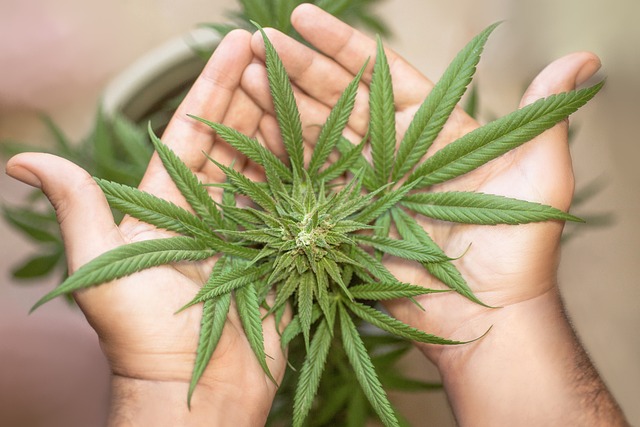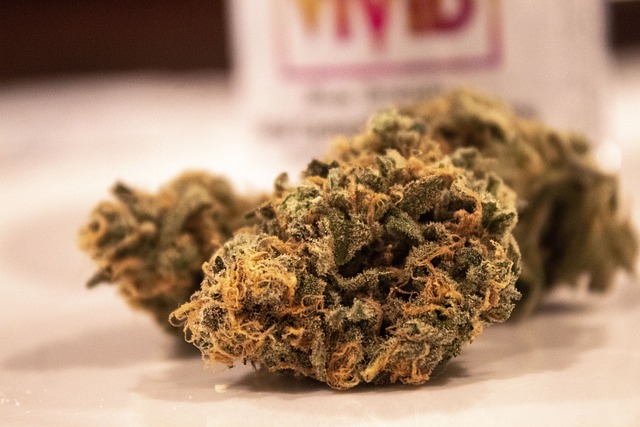As of 2023, THCA (Tetrahydrocannabinolic Acid), a non-psychoactive cannabinoid with potential therapeutic benefits, has a nuanced legal status in Kansas. While federally legal under the 2018 Farm Bill if containing less than 0.3% delta-9-THC, its state-level legality is more restrictive but allows for its use in specific forms within Kansas's limited medical cannabis program. In Kansas, THCA products must be derived from industrial hemp and sold by state-licensed producers to remain legal. Consumers are advised to procure these products from reliable sources that provide proof of compliance with state regulations. The distinction between THCA and delta-9-THC is critical due to differing legal statuses, and users should be aware of the evolving laws at both federal and state levels, as well as the potential health benefits supported by emerging research. It's important for individuals to consult healthcare professionals before incorporating THCA into their health regimen and to stay informed on legislative updates affecting its legal use in Kansas.
Exploring the multifaceted nature of THCA flower, this article serves as a definitive guide for Kansas residents navigating its potential effects and benefits within the state’s evolving legal framework. We delve into how THCA differs from other cannabinoids, offering insights into its unique side effects, dosage considerations, and therapeutic properties as per medical research. With an emphasis on safety and legal standing in Kansas, this article will provide valuable information for those looking to incorporate THCA flower into their health regimen. From storage practices that minimize adverse reactions to understanding the entourage effect within cannabis products, this comprehensive overview addresses the implications of THCA in a health-centric community and anticipates future research directions and regulatory changes at both state and national levels.
- THCA Flower: A Comprehensive Overview for Kansas Residents
- Understanding THCA: Potential Effects and Benefits
- The Legal Landscape of THCA in Kansas
THCA Flower: A Comprehensive Overview for Kansas Residents

THCA, or Tetrahydrocannabinolic Acid, is a non-psychoactive cannabinoid found in the Cannabis sativa plant that has garnered attention for its potential therapeutic benefits. For residents of Kansas, understanding the legal status of THCA flower is crucial due to the evolving landscape of cannabis legislation in the United States. As of the knowledge cutoff in 2023, THCA itself is legal in Kansas under specific conditions. The state has approved low-THC, high-CBD oil for qualified patients suffering from seizure disorders, following the passage of Senate Bill 263 in 2014 and its amendments thereafter. This legislation paved the way for a limited medical cannabis program, albeit with a focus on CBD and THC products that have been processed to remove psychoactive effects.
For those considering incorporating THCA flower into their wellness routine in Kansas, it’s essential to be aware of the state’s strict regulations. While THCA is legal, possessing or using raw cannabis flowers with higher levels of THC remains a federal offense, as per the Farm Bill of 2018 and subsequent amendments. However, Kansas residents can legally purchase and use THCA flower if it contains less than 0.3% delta-9-THC on a dry weight basis, falls under the state’s definition of industrial hemp, and is sourced from licensed hemp producers. It’s important for consumers to procure such products from reputable sources that provide documentation supporting their compliance with state and federal laws. Understanding the distinctions between THCA, CBD, and delta-9-THC can help Kansas residents navigate this nuanced legal environment safely and responsibly.
Understanding THCA: Potential Effects and Benefits

Cannabidiolic acid (THCA) is a non-psychoactive compound found in the cannabis plant that has garnered attention for its potential therapeutic properties. As of my knowledge cutoff in 2023, THCA is legal in Kansas within certain parameters, allowing researchers and consumers to explore its effects and benefits. THCA is recognized for its anti-inflammatory and neuroprotective effects, which may contribute to its use as a natural remedy for pain relief, without the psychoactive effects associated with its decarboxylated form, THC. Preliminary studies suggest that THCA may also offer neuroprotection and could be beneficial in treating conditions like multiple sclerosis due to its influence on the endocannabinoid system, which plays a role in regulating a range of physiological processes. Additionally, THCA is being researched for its potential to inhibit the growth of certain types of cancer cells, although more clinical trials are needed to substantiate these findings. Users interested in exploring the benefits of THCA should be aware of the legal status and dosage guidelines specific to their region and individual health considerations. As with any supplement or medication, it is advisable to consult with a healthcare professional before incorporating THCA into one’s wellness regimen.
The Legal Landscape of THCA in Kansas

In recent years, the legal status of tetrahydrocannabinolic acid (THCA) has been a subject of interest and scrutiny within the legislative landscape of Kansas. THCA, which is the raw form of THC found in hemp and cannabis plants, has garnered attention due to its potential therapeutic benefits and distinct legal classification compared to delta-9-THC. As of the latest updates, THCA is federally legal under the 2018 Farm Bill, provided it contains less than 0.3% delta-9-THC. At the state level, Kansas has navigated a complex path, initially embracing the agricultural aspects of hemp through the Agriculture Improvement Act. This has allowed for the cultivation and processing of hemp and its derivatives, including THCA, within certain legal boundaries set forth by the state’s Department of Agriculture. However, it’s crucial for consumers and businesses dealing with THCA in Kansas to stay informed, as state laws can evolve, and interpretations of these laws can vary. The regulatory environment is particularly nuanced when it comes to the sale and use of products containing THCA, with some municipalities within Kansas having stricter regulations than the state as a whole. Therefore, anyone interested in or currently utilizing THCA products should closely monitor both federal and state legislative developments to ensure compliance with current laws.
In wrapping up our exploration of THCA flower and its presence within the legal framework of Kansas, it’s clear that residents have a growing interest in this cannabinoid. The comprehensive overview provided here underscores the potential effects and benefits associated with THCA consumption, emphasizing its distinct nature from its psychoactive cousin, THC. With a thorough understanding of the legal parameters governing THCA in Kansas, users can make informed decisions about its use. As state legislation continues to evolve, it’s imperative for individuals to stay informed on the changing landscape of cannabinoid legality to navigate these developments responsibly and safely.
